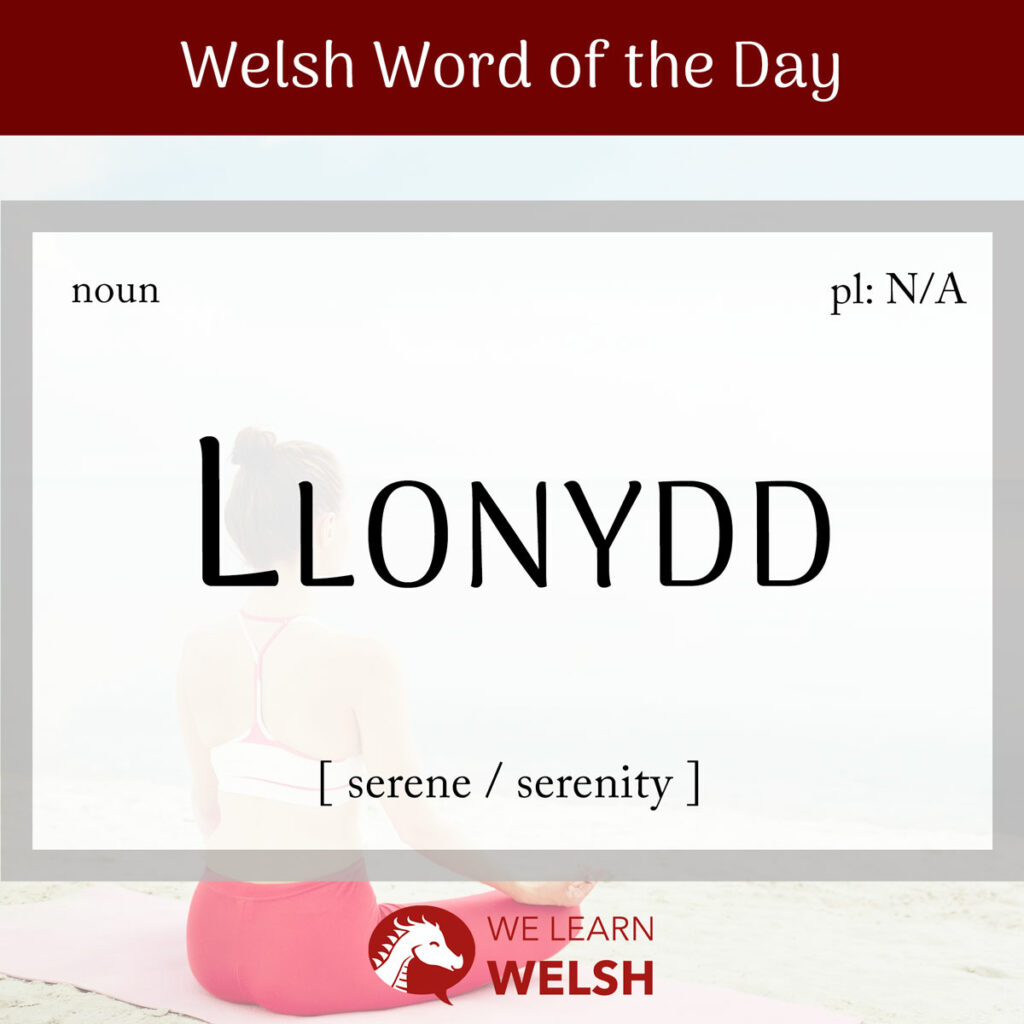Llonydd is one of my favourite Welsh words of all time. It can be used as an adjective or a noun. When it’s a noun, it’s masculine. It’s also abstract and uncountable, so there’s no plural form.
llonydd
serene / serenity
It’s often translated into English as quiet, still, calm, or peaceful, or as the corresponding nouns. In this article, I’ve chosen to render it as serene or serenity, as I feel these words best capture its unique and beautiful nuance.
In South Wales, you’ll sometimes hear it pronounced like this:
If you type peacefulness or serenity into a Welsh dictionary, you’re quite likely to be presented with the alternative form llonyddwch. This is completely synonymous to llonydd, and using either is completely fine. Plus, there’s a verb form, llonyddu, which means to quieten or to calm down.
You might come across the word llon and assume that this is another version of llonydd, but not quite! Llon actually means joyful or cheerful, like the similar word llawen.
There’s also the antonyms aflonydd and aflonyddwch. The first is strictly an adjective and is often used to refer to someone’s mental state as anxious or restless. The second is a noun, and can mean restlessness, commotion or disturbance.
This word probably comes from the adjective llawn, meaning full or whole. This makes sense because llawn appeared as llon in proto-Brittonic. Versions of this root show up in the other Celtic languages with various meanings – Breton has leun which means smooth, for example, and the Scottish Gaelic làn can mean full or big.
Llonydd can only mutate in one way:
Soft mutation
lonydd
Nasal mutation
N/A
Aspirate mutation
N/A
This kind of mutation is what’s called a limited soft mutation. This means that the ll to l change doesn’t happen in all the contexts where other soft mutations would. For example, mor (so) and rhy (too) normally cause soft mutations, but not to words starting with ll (or rh, for that matter). This means that so serene is mor llonydd, completely mutation-free.
Incidentally, mor llonydd â is also how we say as serene as, as still as, or as calm as. For example, the phrase mor llonydd â charreg (as still as a stone) appears in the Welsh Bible, Exodus 15:16.
We all experience feelings of llonydd produced by different activities. Some common examples include:
- ymweld â natur = visiting nature
- gwrando ar gerddoriaeth = listening to music
- coginio = cooking
- ymweld â theulu a ffrindiau = seeing family and friends
- cael bath = taking a bath
- mynd am dro = going for a walk

As I mentioned, we also use the word to mean still or stillness. For example, standing still is sefyll yn llonydd. It also turns up in the proverb dyfnaf llyn, llyn llonydd (the deepest lake is a still lake), which is the equivalent of the English still waters run deep.
Mae’r llyn yn dawel ac yn llonydd.
The lake is peaceful and serene.
One phrase you’ll definitely hear if you hang out around Welsh-speaking families is gad lonydd imi. This literally means leave me peace, but it’s used to mean leave me alone. You can use this in a more general sense, too – gadael llonydd or gadael yn llonydd is to leave alone, in the abstract.
In some parts of Wales, rhoi is used instead of gadael. So, it literally translates as give me peace instead of leave me peace. For example, Geiriadur Prifysgol Cymru gives the example phrase ‘newch chi roi bach o llonydd imi (will you give me a little bit of peace) as having been recorded in Carmarthen.
It’s a bit unfortunate that this is probably the most common way this otherwise lovely word is used in everyday life!

